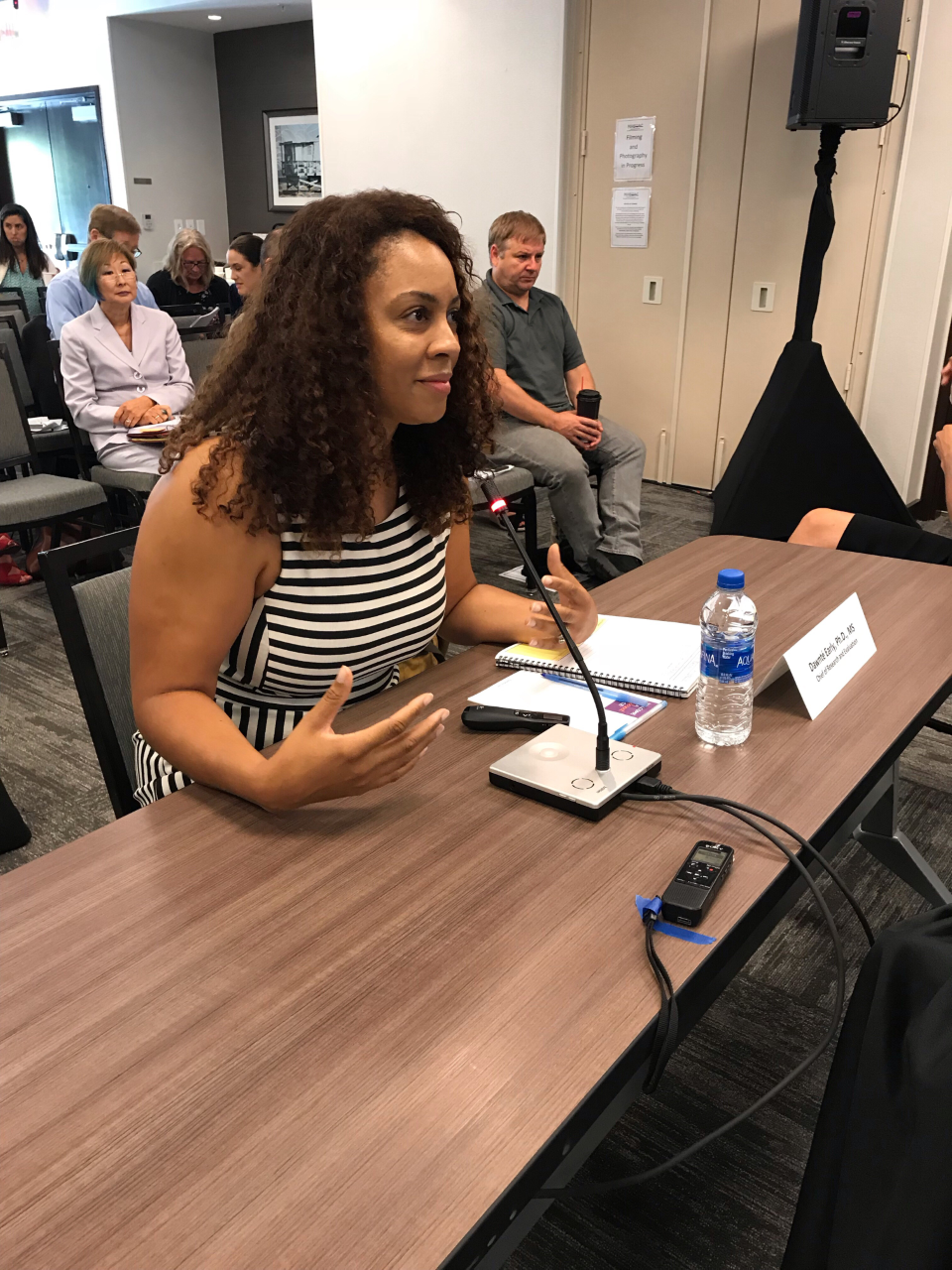Full Service Partnership (FSP) participation strongly associated with reductions in arrest rates both during and after partnerships.
By Carli Million
MHSOAC Communications
The Mental Health Services Oversight and Accountability Commission (MHSOAC) is excited about promising new data that shows a link between mental health services and a reduction in criminal justice involvement.
MHSOAC Chief of Research and Evaluation Dawnté Early, PhD, MS presented the latest update on the Criminal Justice Data Linkage project at the Commission meeting July 25, 2019 in Santa Cruz.
“As you know, the Mental Health Services Act stipulates that mental health programs shall emphasize strategies to reduce incarceration for people with unmet mental health needs,” Dr. Early said. “We did find that there are significant reductions in arrest rates associated with Full Service Partnership participation.”
Preliminary findings from the research presentation, Reducing Criminal Justice Involvement for People with Mental Health Needs, report a significant reduction in arrest rates associated with FSP program participation both during and after partnerships.
Using arrest records from the California Department of Justice and FSP client data from the California Department of Health Care Services, Dr. Early and her team analyzed over 10 years of adult arrest records to better understand the impact of FSP partnerships on involvement in the criminal justice system.

MHSOAC studied more than 64,000 FSP partners and corresponding justice data of approximately 81,000 arrests. The data were analyzed in three main time periods: 12 months before FSP participation, during FSP participation, and 12 months post-FSP participation.
Of the 64,000 partners in the study, 70 percent had no observed arrests before, during, or after participation. Clients who had previous high criminal justice involvement (three or more arrests) in the 12 months before enrollment accounted for about half of all pre-enrollment arrests and were impacted the most from FSP participation.
“There’s the stereotype that if you have a mental health need, then you must be involved in the criminal justice system,” Dr. Early said. “That is not the case. The majority of individuals in this study did not have any criminal justice involvement that we saw in DOJ.”
The preliminary findings suggest a strong association between FSP participation and reductions in arrests. The Commission’s Research team found among all FSP clients:
- A reduction in arrests of 47% from before to during FSP.
- A reduction in arrests of 29% from before to after FSP.
Additionally, among clients who had previous high criminal justice involvement, findings showed:
- A reduction in arrests of 69% from before to during FSP.
- A reduction in arrests of 64% from before to after FSP.
Patterns in arrest rate reductions remained roughly the same when analyzed by gender, age, and ethnicity.
Commissioner Reneeta Anthony shared her son’s experience with Full Service Partnership.
“My son is one of those who started as a Transition Age Youth and he went through a Full Service Partnership,” she said. “At the time he was in FSP in its beginnings, I thought that it wasn’t very effective. He was in the criminal justice system, he had many arrests, he served time in jail. Now he’s been stable and living independently with support for four years and I never thought I’d say that, so thank you.”
The team also explored the relationship between FSP participation and arrest rates for those who reported homelessness. Those who reported homelessness for at least one day in the 12 months prior to FSP participation saw a decline in arrest rates of 49 percent. There was a 43 percent decline for those who did not report recent homelessness.
In an analysis by county, the majority of counties saw a decline in arrests in a range of 36 to 50 percent from before to during FSP participation. Five counties, however, had an increase, and further analysis is needed to explain these results.
The preliminary results of this research suggest that FSP programs have promising implications for reductions in criminal justice involvement; the Commission will continue to study this relationship.
“This is really remarkable,” Commissioner Ken Berrick said about the data. “If there’s a link between program intensity or if we are able to look at certain quality measures and see if there’s a link to these numbers, we start getting into some really exciting stuff, so the drill down from here could tell us a whole lot.”
End
/sites/default/files/dawnte.png
